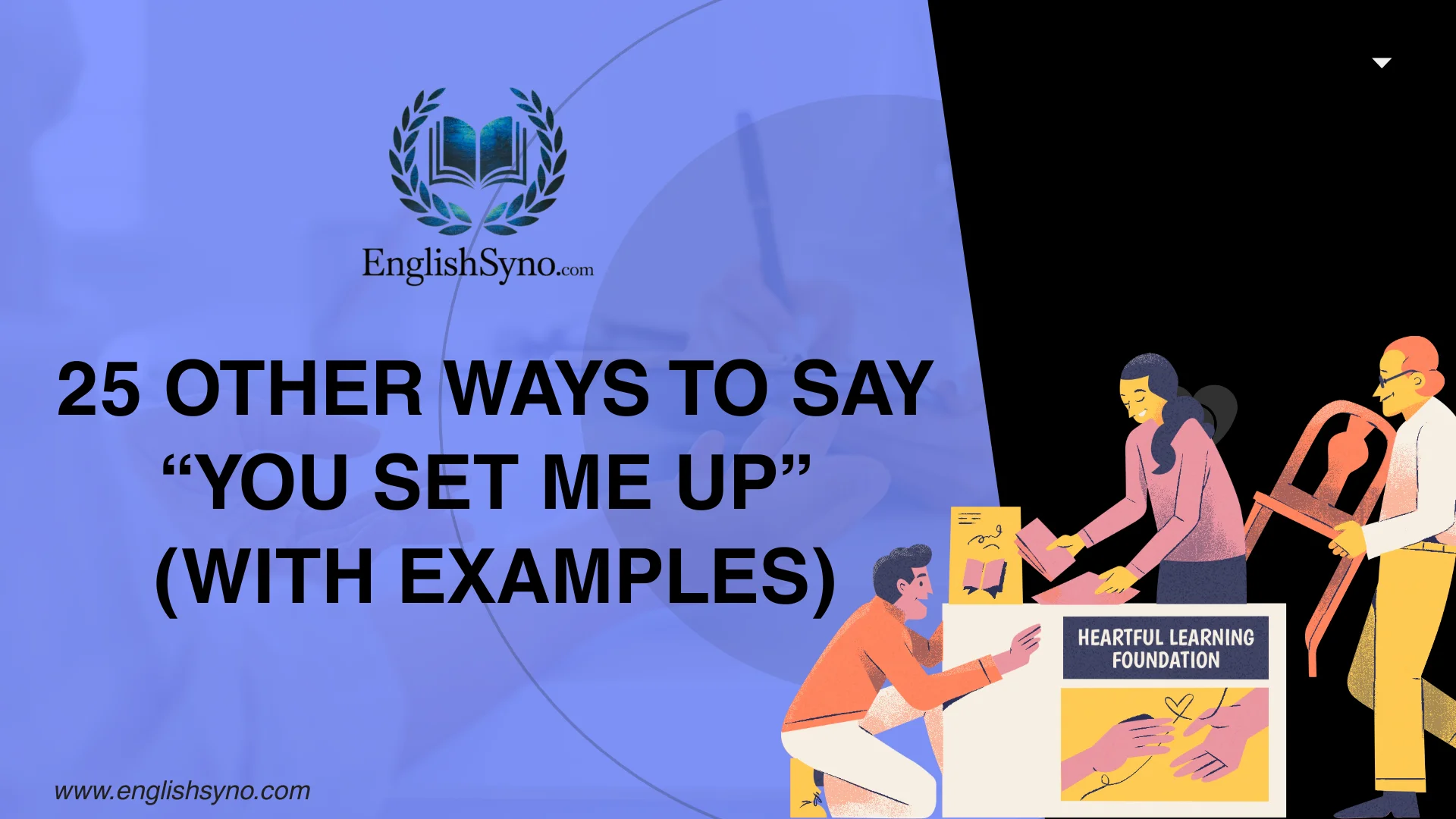Sometimes, the phrase “You Set Me Up” can carry different meanings, so understanding the context is crucial for clarity. Positive actions by someone arranging a date or meeting can help you get set (someone or something) up, making your day easier.
I recall my father-in-law helped me start my own store, giving me financial capital and guidance, support, and advice to maintain the business, which made a huge difference. Small gestures like a B&B offering a generous breakfast also set you up for the rest of the day, providing adequate nourishment and encouragement.
On the flip side, “You Set Me Up” can be negative, leaving you feeling tricked, framed, or made to fall victim to a scam or crime. I once heard of doors locked, police outside, and a no-good liar who set us up. Reports recently show artists trying to set customers up to divulge bank account details over the phone, while drugs that aren’t mine or wrongdoing can make you look guilty. Even everyday life tasks like assembling a slide for my son’s birthday or a doghouse, taking two hours to build and set it up, teach patience, and carefully setting up a TV like John’s makes everything ready to use now.
What Does “You Set Me Up” Mean?
The phrase “You Set Me Up” can have multiple meanings. It may refer to a helpful arrangement, like arranging a meeting or opportunity, or a negative context, such as being tricked or framed. Understanding the context is crucial for using this phrase effectively.
When to Use “You Set Me Up”
Use “You Set Me Up” when describing either a positive act of someone helping or arranging something for you, or a negative act of being deceived. The tone and audience are key to conveying your intended meaning.
Is It Professional/Polite to Say “You Set Me Up”?
This phrase can be casual or informal, depending on context. In professional settings, consider polite alternatives to communicate being helped or misled without sounding accusatory.
Pros or Cons
Pros: Clearly communicates help or deception, easily understood in casual contexts.
Cons: Can sound accusatory or blameful in professional or sensitive contexts.
You Put Me in This Situation
Meaning / Definition: This emphasizes being placed in a specific scenario, often unintentionally or with intent.
Example: “I trusted your advice, but you put me in this situation.”
Best Use: When highlighting circumstances beyond your control.
Worst Use: When accusing casually; may sound harsh.
Tone: Honest, reflective.
You Got Me Involved
Meaning / Definition: Refers to someone causing your participation or involvement.
Example: “I didn’t want to attend, but you got me involved in the project.”
Best Use: Friendly, light situations.
Worst Use: Serious accusation without proof.
Tone: Casual, slightly playful.
You Framed Me
Meaning / Definition: Suggests being falsely accused or set up for something you didn’t do.
Example: “I can’t believe you framed me for that mistake!”
Best Use: Legal or clearly wrongful contexts.
Worst Use: Casual use may sound dramatic.
Tone: Serious, accusatory.
You Tricked Me
Meaning / Definition: Implies being misled through deception or a prank.
Example: “I didn’t know it was a joke; you really tricked me!”
Best Use: Friendly or playful misdirection.
Worst Use: When discussing serious matters, it may reduce credibility.
Tone: Playful, informal.
You Helped Me Out
Meaning / Definition: Focuses on positive support or being assisted.
Example: “Thanks for helping me out with the presentation.”
Best Use: Professional and friendly contexts.
Worst Use: Not suitable for expressing negative experiences.
Tone: Appreciative, warm.
You Set Me Up for Success
Meaning / Definition: Emphasizes preparation and support for achieving goals.
Example: “Your guidance really set me up for success in my new role.”
Best Use: Positive reinforcement in professional or personal contexts.
Worst Use: Ironically, in a negative context, could confuse tone.
Tone: Encouraging, supportive.
You Put Me On the Spot
Meaning / Definition: Highlights being forced into a situation unexpectedly.
Example: “You really put me on the spot during the meeting!”
Best Use: When describing pressure in social or professional contexts.
Worst Use: Overused; may sound dramatic for minor situations.
Tone: Honest, slightly tense.
You Set Things in Motion for Me
Meaning / Definition: Indicates someone initiated steps that help or affect you.
Example: “Thanks, you set things in motion for me to finish the project early.”
Best Use: Professional or thoughtful gestures.
Worst Use: Not for negative scenarios.
Tone: Appreciative, formal.
You Arranged Everything for Me
Meaning / Definition: Shows someone took care of planning or organization on your behalf.
Example: “You arranged everything for me at the event; it was perfect!”
Best Use: Gratitude-focused or social events.
Worst Use: Avoid in serious negative contexts.
Tone: Warm, grateful.
You Put Me in a Bind
Meaning / Definition: Indicates being put in a difficult or tricky situation.
Example: “I was unprepared; you really put me in a bind!”
Best Use: Honest disclosure of stress or difficulty.
Worst Use: Minor inconveniences; could sound dramatic.
Tone: Frustrated, realistic.
You Pulled Me Into This
Meaning / Definition: Suggests being involved because of someone else’s actions.
Example: “I didn’t want to attend the meeting, but you pulled me into this.”
Best Use: Friendly or professional, highlighting influence.
Worst Use: Blaming unnecessarily.
Tone: Casual, slightly playful.
You Placed Me There
Meaning / Definition: Indicates positioning in a physical, social, or professional context.
Example: “You placed me there during the photo shoot; I looked awkward!”
Best Use: Describing situational placement.
Worst Use: Overly literal situations.
Tone: Informative, casual.
You Got Me Into Trouble
Meaning / Definition: Shows someone caused negative consequences.
Example: “You got me into trouble by missing the deadline!”
Best Use: Expressing accountability in personal contexts.
Worst Use: Accusing in serious legal matters without proof.
Tone: Frustrated, honest.
You Put Me Forward
Meaning / Definition: Highlights being nominated or considered for something.
Example: “You put me forward for the team lead position; I appreciate it.”
Best Use: Positive professional contexts.
Worst Use: Avoid in negative framing situations.
Tone: Appreciative, formal.
You Set Me Straight
Meaning / Definition: Means correcting or guiding someone properly.
Example: “Thanks for setting me straight about the project guidelines.”
Best Use: Advice or guidance scenarios.
Worst Use: Can sound condescending if used poorly.
Tone: Friendly, instructive.
You Lured Me In
Meaning / Definition: Suggests being drawn into a situation, often deceptively.
Example: “I didn’t plan to join, but you lured me in with your pitch.”
Best Use: Light teasing or storytelling.
Worst Use: Serious accusations; may sound manipulative.
Tone: Playful or slightly wary.
You Got Me Mixed Up
Meaning / Definition: Implies confusion due to someone else’s actions.
Example: “You got me mixed up with the schedule, and I was late.”
Best Use: Explaining honest mistakes.
Worst Use: Blaming minor confusions unnecessarily.
Tone: Casual, honest.
You Put Me Ahead
Meaning / Definition: Shows being advanced or given an advantage.
Example: “Your recommendation really put me ahead in the selection process.”
Best Use: Career, personal growth, or mentorship.
Worst Use: Avoid negative contexts.
Tone: Grateful, encouraging.
You Set Me Back
Meaning / Definition: Indicates someone caused a delay or setback.
Example: “Missing those files really set me back on the project.”
Best Use: Professional or personal setbacks.
Worst Use: Minor inconveniences; can sound dramatic.
Tone: Honest, frustrated.
You Put Me Up to It
Meaning / Definition: Suggests someone encouraged or persuaded an action.
Example: “I wouldn’t have tried it if you hadn’t put me up to it!”
Best Use: Friendly, playful contexts.
Worst Use: Serious accusations; may reduce credibility.
Tone: Playful, casual.
You Got Me Set Up
Meaning / Definition: Shows preparation or arrangement for an event or task.
Example: “You got me set up for the meeting with everything ready.”
Best Use: Appreciative and professional scenarios.
Worst Use: Not for negative or deceptive contexts.
Tone: Warm, positive.
You Positioned Me
Meaning / Definition: Indicates someone placed or arranged your role or spot.
Example: “You positioned me perfectly for the presentation.”
Best Use: Professional or social arrangement.
Worst Use: Overused literally.
Tone: Professional, formal.
You Guided Me
Meaning / Definition: Focus on direction, mentorship, or support.
Example: “You guided me through the new software efficiently.”
Best Use: Mentorship, training, or advice.
Worst Use: Avoid when describing negative manipulation.
Tone: Appreciative, instructional.
You Orchestrated This for Me
Meaning / Definition: Highlights careful planning or arrangement done by someone.
Example: “You orchestrated this for me so everything went smoothly.”
Best Use: Expressing gratitude for organized efforts.
Worst Use: Avoid in casual minor events.
Tone: Formal, appreciative.
You Set the Stage for Me
Meaning / Definition: Emphasizes preparing conditions for success or involvement.
Example: “You set the stage for me to succeed in the project presentation.”
Best Use: Professional or mentoring contexts.
Worst Use: Not for negative or manipulative situations.
Tone: Encouraging, positive.
Final Thoughts
Finding the right way to say “You Set Me Up” can make a huge difference in how your message is received. Language is more than words; it conveys intent, emotion, and tone. Using thoughtful alternatives helps you communicate clearly, whether highlighting support, assistance, or being misled. Positive expressions, such as “You set me up for success” or “You guided me,” emphasize care, preparation, and mentorship, making interactions feel warm and meaningful. On the other hand, phrases like “You tricked me” or “You framed me” allow you to express frustration, bewilderment, or injustice without sounding harsh if used carefully. Choosing the right phrasing depends on context, relationship, and desired tone.
It’s also essential to consider the audience—what works in a professional setting may not suit casual conversations. Using alternatives effectively can prevent misunderstandings, foster trust, and strengthen connections. Remember, the goal is clarity and empathy: conveying your experience or feelings while maintaining respect. Thoughtful word choice demonstrates emotional intelligence and ensures your communication feels authentic, engaging, and impactful. By mastering these expressions, you can navigate social and professional situations gracefully, whether giving credit, asking for help, or describing a tricky situation. Ultimately, alternatives to “You Set Me Up” provide versatility and subtlety, letting you express complex situations with precision, warmth, and thoughtful phrasing, making your messages resonate more deeply with others.
FAQs
What does “You Set Me Up” mean?
It can mean either that someone helped arrange something for you or intentionally misled you. Context determines whether it is positive or negative.
Is “You Set Me Up” polite?
In casual settings, yes. In professional or sensitive contexts, alternatives may be more polite and less accusatory.
When should I use “You Set Me Up”?
Use it when explaining support, guidance, or situations where someone caused you to be involved intentionally.
Can it be used positively?
Absolutely. Phrases like “You set me up for success” express preparation, guidance, and care.
Can it be used negatively?
Yes, in contexts like being tricked, framed, or placed in a difficult situation.
What are polite alternatives?
“You guided me,” “You helped me out,” or “You set the stage for me” are professional and warm alternatives.
Is it professional to say it?
Depends on context. In professional settings, focus on alternatives emphasizing guidance or support rather than blame.
How do I express frustration politely?
Use “You put me in a bind” or “You pulled me into this” instead of aggressive phrasing.
Does it work in emails?
Yes, especially with positive alternatives, but avoid negative phrasing in formal emails.
Can it describe social situations?
Yes, friendly contexts can use both positive and playful negative phrases like “You tricked me.”
How to convey gratitude?
Use “You set me up for success” or “You helped me out” to clearly express appreciation.
How to express feeling tricked?
“You tricked me” or “You framed me” communicates deception effectively but should be used cautiously.
What tone is best?
Tone depends on intent: playful, grateful, frustrated, or serious, depending on context and audience.
Can it strengthen relationships?
Yes, choosing the right phrase fosters trust, shows emotional intelligence, and conveys clarity and respect.
Are there cultural considerations?
Yes, some expressions may seem direct or accusatory in certain cultures. Always consider audience, tone, and context for clarity and respect.

Muhammad Altaf is an English language specialist and professional content strategist with over 10 years of experience writing and teaching practical English usage, professional communication, and tone awareness. His work focuses on helping readers express ideas clearly, naturally, and confidently in real-world contexts.


